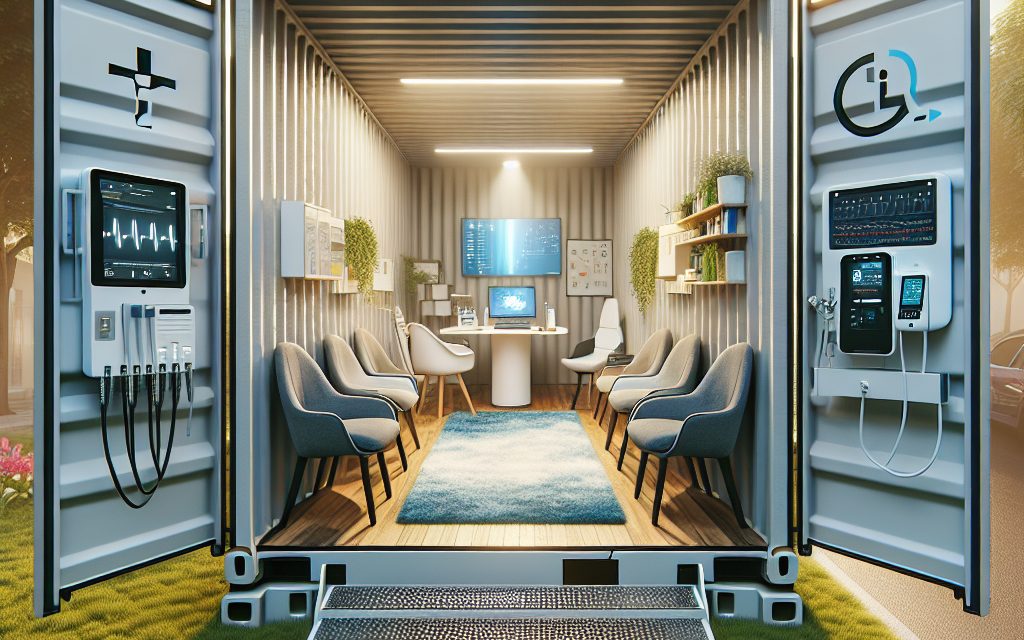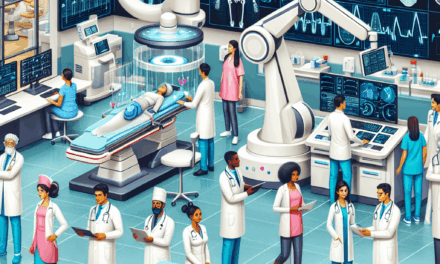Transforming Telehealth: Shipping Containers as Innovative Mobile Clinics
The healthcare landscape is undergoing a significant transformation, driven by technological advancements and the need for accessible medical services. One of the most innovative solutions emerging in this space is the use of shipping containers as mobile clinics. This article explores how shipping containers are being repurposed to create efficient, cost-effective, and flexible healthcare solutions, particularly in underserved areas. We will delve into five key subtopics: the design and functionality of mobile clinics, the impact on healthcare accessibility, case studies of successful implementations, the role of technology in enhancing telehealth services, and the future of mobile clinics in global health.
1. Design and Functionality of Mobile Clinics
Shipping containers are robust, portable, and versatile structures that can be easily transformed into fully functional medical clinics. The design of these mobile clinics is crucial to their effectiveness in delivering healthcare services. Here, we will explore the various aspects of their design and functionality.
1.1 Structural Adaptations
Shipping containers are designed to withstand harsh conditions, making them ideal for conversion into mobile clinics. The structural integrity of these containers allows for modifications that can accommodate medical equipment, waiting areas, and examination rooms. Key adaptations include:
- Insulation and Climate Control: Proper insulation is essential for maintaining a comfortable environment for both patients and healthcare providers. Climate control systems, including heating and air conditioning, are often installed to ensure optimal conditions.
- Electrical and Water Systems: Mobile clinics require reliable electrical systems to power medical equipment. Water systems for sanitation and patient care are also integrated, including sinks, toilets, and sometimes even showers.
- Accessibility Features: To cater to all patients, mobile clinics are designed with accessibility in mind. This includes ramps for wheelchair access and spacious interiors to accommodate patients with mobility challenges.
1.2 Interior Layout
The interior layout of a mobile clinic is designed to maximize efficiency and patient comfort. Common features include:
- Examination Rooms: These are equipped with essential medical tools and privacy screens to ensure patient confidentiality.
- Waiting Areas: Comfortable seating and informational materials help create a welcoming environment for patients.
- Storage Solutions: Adequate storage for medical supplies, equipment, and patient records is crucial for operational efficiency.
1.3 Modular Design
Many mobile clinics utilize a modular design, allowing for easy expansion or reconfiguration based on the needs of the community. This flexibility is particularly beneficial in response to public health emergencies, such as pandemics or natural disasters.
In summary, the design and functionality of shipping container mobile clinics are tailored to meet the diverse needs of healthcare delivery. Their adaptability, structural integrity, and thoughtful interior layouts make them a viable solution for improving access to healthcare services.
2. Impact on Healthcare Accessibility
One of the most significant advantages of mobile clinics is their ability to enhance healthcare accessibility, particularly in rural and underserved urban areas. This section examines how shipping container clinics are bridging the gap in healthcare access.
2.1 Addressing Geographic Barriers
Many communities face geographic barriers that limit access to healthcare facilities. Mobile clinics can travel to remote locations, providing essential services where traditional healthcare infrastructure is lacking. Key benefits include:
- Reduced Travel Time: Patients no longer need to travel long distances to receive care, which is particularly important for those with chronic conditions or mobility issues.
- Increased Service Frequency: Mobile clinics can establish regular schedules in various locations, ensuring consistent access to healthcare services.
- Community Engagement: By bringing healthcare services directly to communities, mobile clinics foster trust and encourage individuals to seek care.
2.2 Culturally Competent Care
Mobile clinics often employ local healthcare providers who understand the cultural nuances of the communities they serve. This cultural competence is vital for building rapport with patients and ensuring that care is respectful and relevant. Benefits include:
- Language Services: Local providers can offer services in the community’s primary language, reducing barriers to communication.
- Tailored Health Education: Mobile clinics can provide health education that resonates with the community’s values and beliefs, improving health literacy.
- Trust Building: Familiarity with local customs and practices helps build trust between healthcare providers and patients, leading to better health outcomes.
2.3 Addressing Health Disparities
Health disparities are prevalent in many communities, often due to socioeconomic factors. Mobile clinics play a crucial role in addressing these disparities by providing:
- Preventive Care: Regular screenings and vaccinations can be offered, reducing the incidence of preventable diseases.
- Chronic Disease Management: Mobile clinics can provide ongoing care for chronic conditions, helping patients manage their health effectively.
- Mental Health Services: Many mobile clinics incorporate mental health services, addressing a critical aspect of overall health that is often overlooked.
In conclusion, shipping container mobile clinics significantly enhance healthcare accessibility by overcoming geographic barriers, providing culturally competent care, and addressing health disparities. Their ability to reach underserved populations is a game-changer in the quest for equitable healthcare.
3. Case Studies of Successful Implementations
To understand the real-world impact of shipping container mobile clinics, it is essential to examine successful case studies. This section highlights several notable implementations that demonstrate the effectiveness of this innovative approach.
3.1 The Health Wagon in Virginia, USA
The Health Wagon is a nonprofit organization that operates mobile clinics in rural Virginia, utilizing repurposed shipping containers to deliver healthcare services. Key aspects of their success include:
- Comprehensive Services: The Health Wagon provides a range of services, including primary care, dental care, and mental health services, all within their mobile clinics.
- Community Partnerships: Collaborating with local organizations has allowed the Health Wagon to expand its reach and enhance service delivery.
- Impact on Health Outcomes: The organization has reported improved health outcomes in the communities it serves, particularly in managing chronic diseases.
3.2 The Mobile Clinic Project in South Africa
In South Africa, the Mobile Clinic Project has successfully utilized shipping containers to provide healthcare services in underserved areas. Key highlights include:
- HIV/AIDS Testing and Treatment: The mobile clinics focus on HIV/AIDS testing and treatment, addressing a critical public health issue in the region.
- Community Health Workers: Local health workers are trained to operate the clinics, ensuring culturally appropriate care and fostering community trust.
- Data-Driven Approach: The project uses data analytics to identify areas of need and optimize service delivery, resulting in increased patient engagement.
3.3 The Mobile Health Unit in Canada
In Canada, mobile health units have been deployed to serve Indigenous communities, utilizing shipping containers as clinics. Key features of this initiative include:
- Holistic Care: The mobile units provide holistic care that incorporates traditional healing practices alongside conventional medicine.
- Community Involvement: Indigenous community members are actively involved in the planning and operation of the clinics, ensuring that services meet local needs.
- Positive Health Outcomes: The initiative has led to increased access to healthcare services and improved health outcomes for Indigenous populations.
These case studies illustrate the versatility and effectiveness of shipping container mobile clinics in diverse settings. By addressing specific community needs and leveraging local resources, these initiatives have made a significant impact on healthcare delivery.
4. The Role of Technology in Enhancing Telehealth Services
Technology plays a pivotal role in the success of mobile clinics, particularly in enhancing telehealth services. This section explores how technology is integrated into shipping container clinics to improve patient care and operational efficiency.
4.1 Telemedicine Capabilities
Many mobile clinics are equipped with telemedicine technology, allowing healthcare providers to connect with specialists remotely. Key benefits include:
- Access to Specialists: Patients can receive consultations from specialists without the need for travel, improving access to expert care.
- Real-Time Monitoring: Telehealth technology enables real-time monitoring of patients with chronic conditions, facilitating timely interventions.
- Increased Efficiency: Telemedicine reduces wait times and streamlines the patient care process, enhancing overall clinic efficiency.
4.2 Electronic Health Records (EHR)
Implementing electronic health records (EHR) systems in mobile clinics allows for better data management and patient tracking. Key advantages include:
- Improved Patient Care: EHR systems provide healthcare providers with instant access to patient histories, enabling informed decision-making.
- Data Analytics: EHRs facilitate data analysis, helping clinics identify trends and improve service delivery based on patient needs.
- Enhanced Communication: EHR systems improve communication between healthcare providers, ensuring coordinated care for patients.
4.3 Mobile Health Applications
Mobile health applications are increasingly being used in conjunction with mobile clinics to enhance patient engagement and education. Key features include:
- Appointment Scheduling: Patients can schedule appointments through mobile apps, reducing administrative burdens on clinic staff.
- Health Education Resources: Apps can provide patients with educational materials tailored to their specific health needs, promoting self-management.
- Remote Monitoring: Patients can use wearable devices to track their health metrics, which can be monitored by healthcare providers remotely.
In summary, technology is integral to the operation of shipping container mobile clinics, enhancing telehealth services and improving patient care. By leveraging telemedicine, EHR systems, and mobile health applications, these clinics can provide comprehensive and efficient healthcare services.
5. The Future of Mobile Clinics in Global Health
The future of mobile clinics, particularly those utilizing shipping containers, holds great promise for global health. This section explores emerging trends and potential developments in this innovative healthcare delivery model.
5.1 Expansion into Urban Areas
While mobile clinics have primarily focused on rural and underserved areas, there is a growing recognition of their potential in urban settings. Key considerations include:
- Addressing Urban Health Disparities: Mobile clinics can target low-income neighborhoods with limited access to healthcare facilities, providing essential services where they are most needed.
- Collaboration with Local Organizations: Partnerships with community organizations can enhance outreach efforts and improve service delivery in urban areas.
- Flexibility in Service Delivery: Mobile clinics can adapt to changing urban dynamics, offering services during public health emergencies or community events.
5.2 Integration with Public Health Initiatives
Mobile clinics can play a vital role in supporting public health initiatives, particularly in response to outbreaks or health crises. Key aspects include:
- Vaccination Campaigns: Mobile clinics can be deployed for vaccination drives, ensuring that communities receive timely immunizations.
- Health Education and Promotion: Clinics can serve as platforms for health education campaigns, raising awareness about preventive measures and healthy behaviors.
- Data Collection for Public Health Research: Mobile clinics can contribute valuable data for public health research, helping to inform policy decisions and resource allocation.
5.3 Sustainable Practices
As the focus on sustainability grows, mobile clinics are increasingly adopting eco-friendly practices. Key trends include:
- Solar Power Integration: Many mobile clinics are equipped with solar panels, reducing reliance on traditional energy sources and minimizing their carbon footprint.
- Waste Reduction Strategies: Clinics are implementing waste reduction strategies, including recycling and proper disposal of medical waste.
- Community Involvement in Sustainability Efforts: Engaging communities in sustainability initiatives fosters a sense of ownership and responsibility for local health resources.
In conclusion, the future of mobile clinics utilizing shipping containers is bright, with opportunities for expansion into urban areas, integration with public health initiatives, and a focus on sustainability. As healthcare continues to evolve, these innovative solutions will play a crucial role in addressing global health challenges.
Conclusion
The use of shipping containers as mobile clinics represents a transformative approach to healthcare delivery. By enhancing accessibility, providing culturally competent care, and leveraging technology, these clinics are making significant strides in improving health outcomes for underserved populations. The successful case studies highlighted in this article demonstrate the potential of this model to address pressing healthcare needs in diverse settings.
As we look to the future, the expansion of mobile clinics into urban areas, their integration with public health initiatives, and the adoption of sustainable practices will further enhance their impact on global health. The innovative use of shipping containers in telehealth is not just a trend; it is a vital component of a more equitable and accessible healthcare system.
In summary, shipping container mobile clinics are revolutionizing the way healthcare is delivered, making it more accessible, efficient, and responsive to community needs. As we continue to explore and invest in these innovative solutions, we move closer to achieving health equity for all.





